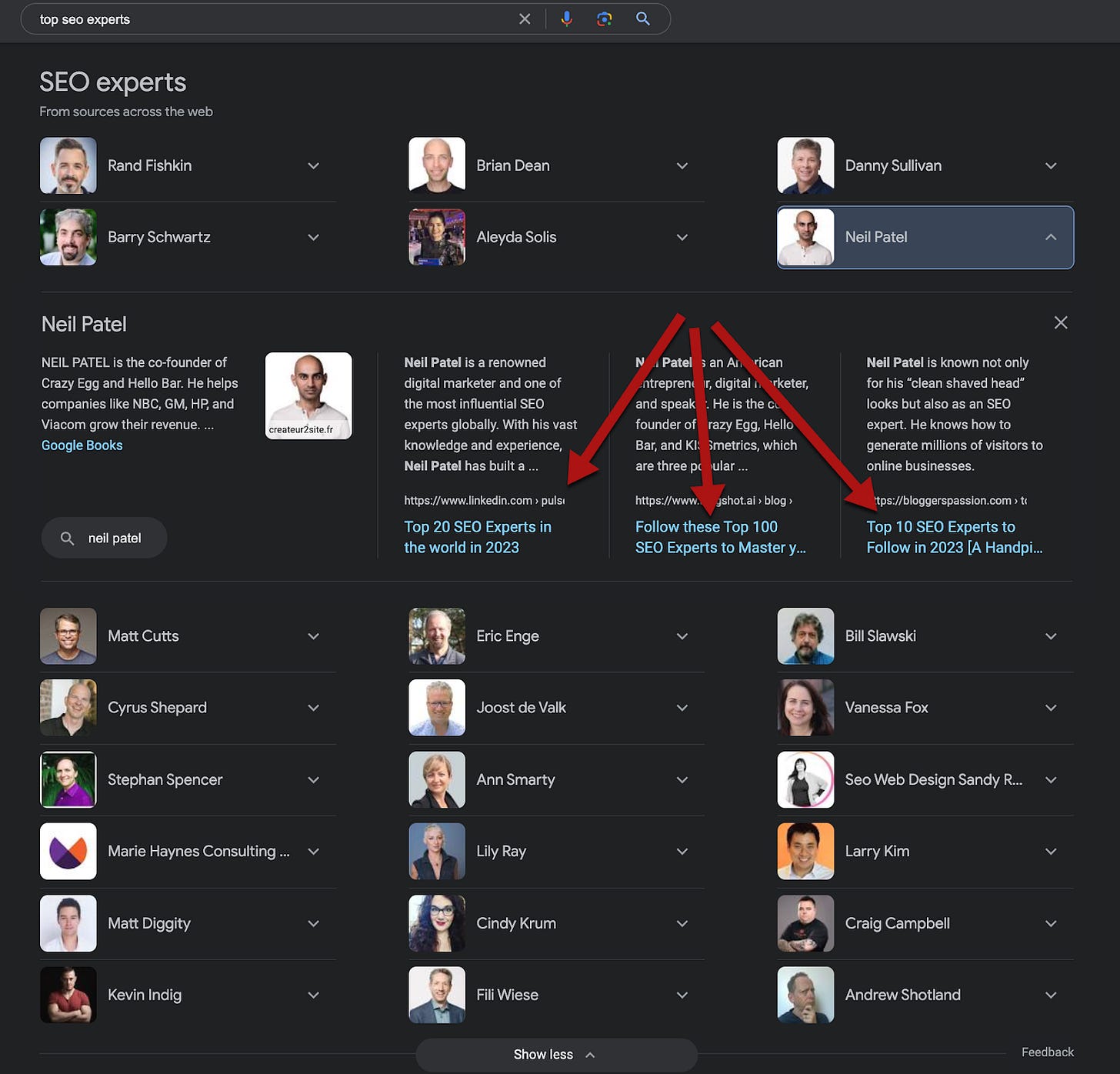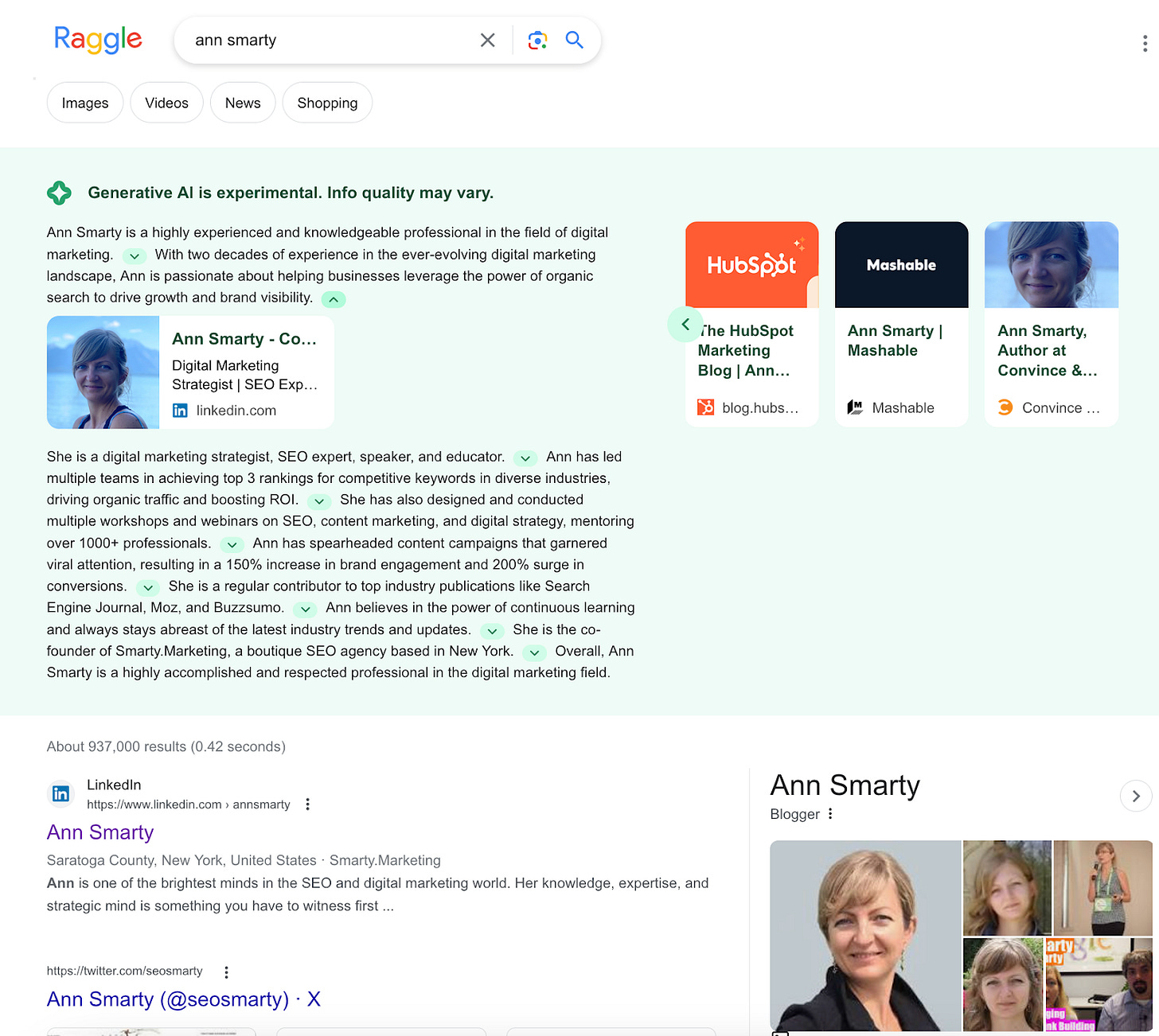Google SEO and Topical Authority: It Is All About Vanity Metrics, Yet Again
Google's looking for topical authority and "hidden gem" is still about ego-bait.
Google has been desperately trying to surface real expertise, for years, and now this battle has become even more desperate: They need to prepare for the flood of AI-generated content that is bound to make their search results useless.
But at the end of the day: How can an algorithm distinguish expertise (topical authority)?
It is all about vanity metrics… We see it again and again, from EEAT guidelines to their “Topic authority” explanation in the news results:
You need to have an established authorship
You need to get cited (get interviewed, write books, and generate search volumes for your name).
You need to be loud and to be seen.
The truth is, the loudest does not always equal the smartest.
Our little SEO industry is a good example. Some of the smartest folks in the industry don’t often have a knowledge graph. Let’s search for “Top SEO experts” and see what Google’s Knowledge Graph knows about those and how those experts got there:
Are you getting what I am hinting at? It is all about those lists, lists we usually mock because they are poorly researched, surfacing the loudest people in the industry.
I am not saying this whole list pulled from Google’s Knowledge Graph is all wrong. I mean… I am there as well.
What I am saying is that you need to be loud to get there, and not all real experts can or want to be loud.
I know perfectly well how I got there. I participated in blogger awards set up by another entity. I usually shy away from any awards or nominations because I despise begging for votes, and for some reason, once you are nominated, you feel obliged to do that.
That one time I agreed and that got my name into Google’s Knowledge Graph. And getting there means staying there.
Now, with Google’s SGE snapshots seemingly being inevitable, things are going to get worse because Google’s Bard uses the same lists and signals Google does. So unless you or your product appears in countless lists, awards, and nominations, you will never be found.
So what am I getting at?
As a consultant, I’ll keep recommending clients As a consultant, I’ll keep recommending clients go out there and be loud. It doesn’t matter how good their product is or how knowledgeable their experts are. Creating helpful content is not going to be enough. They need to be listed and awarded.
And “hidden gems” are not going to be about finding and surfacing true experts in any niche. Because Google is not going to be able to find the real “hidden gems” unless those are loud discussions (arguably representing first-hand experience with your product or brand)
Speaking of which, I invite you to read my previous digest on utilizing Reddit to better control your branded search. It is even more relevant today than it was a week ago.
It is still all about being loud to be found.
The tool of the week:
Raggle: This is a cool tool by Michael King allowing you to preview what your branded SGE snapshot could look like, partly based on how informative your top-ranking URLs are. This is not Google’s mirror but it utilizes many algorithms that run behind Google’s search. Run it for your brand name and for your competitor/peer to better understand what your brand looks like to a machine.
The article of the week:
What Pandu Nayak Taught Me About SEO: AJ Kohn’s fabulous coverage of Google’s Vice President of Search on how Google uses Navboost, Google’s algorithm that adjusts navigational search rankings by “memorizing organic search click data.” This article is included here because it is directly related to the digest topic, i.e. brand signals in search. AJ Kohn’s actionable advice here:
Even before I knew about Navboost I was certain that brands had an advantage due to aided awareness. That meant I talked about being active on social platforms and pushed clients to invest in partnerships.
The idea is to be everywhere your customer is on the Internet. Whether they are on Pinterest or a niche forum or another site I want them to run into my client’s site and brand.
Perhaps the most important expression of this idea is long-tail search optimization. I push clients to scale short-form content that precisely satisfies long-tail query intent. These are usually top-of-funnel queries that don’t lead to a direct conversion.
Thing is, it is some of the cheapest forms of branding you can do online. Done right, you are getting positive brand exposure to people in-market for that product. And that all adds up.
Because the next time a user searches – this time a more mid or bottom-of-funnel term – they might recognize your brand, associate it with that prior positive experience and … click!




I checked to see if I had a knowledge panel. I input "Paul Chaney author and writer." A knowledge panel showed up, but Google confuses me with another Paul Chaney, a professor at Cardiff University. If I claim my knowledge panel, can I fix that?
I feel stupid for asking this, but what does "step on their throats" mean?